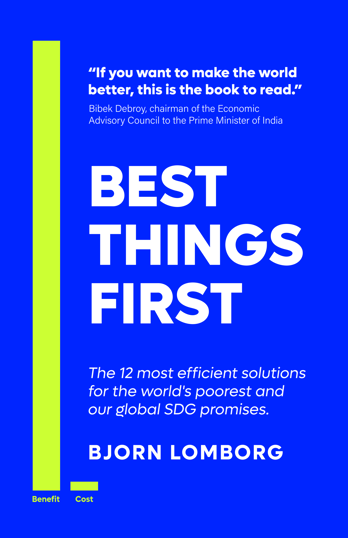Best Things First
The 12 most efficient solutions for the world's poorest and our global SDG promises.
If you want to make the world better, 'Best Things First' is the book to read.
Bibek Debroy, chief economic advisor to India's PM Modi

About the book
World leaders have promised everything to everyone. But they are failing. The UN’s Sustainable Development Goals are supposed to be delivered by 2030. The goals literally promise everything, like eradicating poverty, hunger and disease; stopping war and climate change, ending corruption, fixing education along with countless other promises. This year, the world is at halftime for its promises, but nowhere near halfway. Together with more than a hundred of the world’s top economists, best-selling author, Bjorn Lomborg, has worked for years to identify the world’s best solutions.
If we can’t do everything, let’s do the best things first
Bjorn Lomborg
Based on 12 new, peer-reviewed studies, forthcoming in Cambridge University Press’ Journal of Benefit-Cost Analysis, his new book highlights how to make the world a better place in the best possible way.
“Some things are difficult to fix, cost a lot, and help little. Other problems we know how to fix, at low cost, with remarkable outcomes. We should do the smart things first,” says Bjorn Lomborg.
Governments and philanthropists should focus on the 12 smartest things. Fix tuberculosis, malaria, and chronic disease, tackle malnutrition, improve education, increase trade, implement e-procurement, and secure land tenure. This will, at a low cost, improve the world amazingly.
“The cost is $35 billion a year. Spent on the 12 best solutions it could make the world’s poor incredibly much better off.
The benefits include saving 4.2 million lives each year and generating $1.1 trillion more for the world’s poor,” highlights Bjorn Lomborg.
We can definitely afford it: The cost of $35 billion is equivalent to the increase in annual global spending on cosmetics over the last two years.
The benefits will be amazing for the world’s 4 billion poorest. The policies will avoid every seventh death while making everyone 11% richer. Each dollar spent will deliver $52 of global benefits. This is likely the best thing the world can do this decade.
Praise for Best Things First
Today, nearly every indicator of the Sustainable Development Goals is off-track. But it’s not a rea-son to give up. We can and must do much better. This book offers thought-provoking ideas and concrete policy recommendations for how we can accelerate progress to reduce suffering and save lives.
Bill Gates
We can’t do everything. This book makes a compelling argument for the world to pursue the most cost-effective policies first. The remarkable conclusion is that the best policies pay off more than 50:1.
Larry Summers, former US Secretary of Treasury, president emeritus of Harvard University
If you want to make the world better, Best Things First is the book to read. It highlights 12 policies that can reshape the world. As India hosts G20, these are India’s priorities too.
Bibek Debroy, chief economic advisor to India's PM Modi
This is a rare and insightful book. With too many glib political promises and too few resources for development, the world needs to do better. With a focus on benefit-cost analysis, this book reveals how. It is a must-read for economists, development professionals, and anyone interested in improving the conditions for the world’s worst-off.
Indermit Gill, Chief Economist World Bank
Africa doesn’t need more praiseworthy declarations. It needs more efficient policies. Best Things First offers policymakers a spectacular and comprehensive compendium of the very best policies.
Dr. Kodjo E. Mensah-Abrampa; Director General, National Development Planning Commission, Ghana; Chairman of Intergovernmental Committee of Senior Officials and Experts (ICSOE) for West Africa
There are no solutions, only trade off opportunities. In keeping with Bjorn Lomborg's record of contributions, this incredible book offers the 12 best trade-offs for the big challenges facing the world.
Vernon Smith, Nobel Laureate, professor of business economics and law at Chapman University
Economic research consistently shows that the best policies can make the world incredibly much better at moderate cost. This book is amazing: it documents 12 of the very best global policies. Now we just have to do them.
Nyovani Madise, Director of Research and Sustainable Development Policies at the African Institute for Development Policy